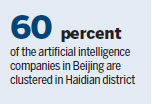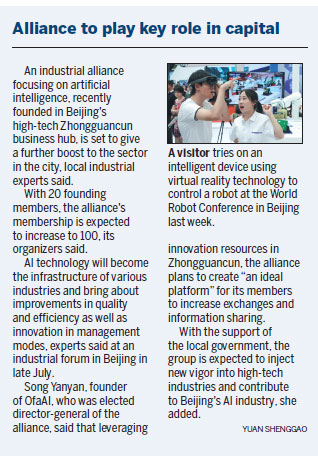As a national hub for innovation, Beijing is attracting a growing number of artificial intelligence companies, according to a white paper on the development of the city's AI industry recently.
The report, released by the Beijing Commission of Economy and Information Technology, shows that as of May 8 this year, more than 4,000 companies involved in AI businesses were operating in China, and more than one-quarter of them are based in Beijing.
Roughly 60 percent of the AI companies in Beijing are clustering in Haidian district, according to the report, which said computer vision, intelligent robots and natural language processing are the most popular areas that Chinese AI companies are focused on.

The report found that AI businesses in Beijing began to gather momentum in 2014 and reported "explosive growth" between 2015 and 2016.
Behind the industrial boom is Beijing's advantages in policies, professionals, innovation, software research and development, and patents, analysts said.
Since 2015, the Chinese government has rolled out a series of policies to encourage the growth of the AI industry.
Beijing is home to more than half of China's major research institutes specializing in the AI industry, including Peking University, Tsinghua University, Beihang University and the institutes of automation and computing technology at the Chinese Academy of Sciences.
The city also boasts over 10 key national laboratories in the sector. To date, local AI businesses have secured 1,000 patents.
Data from a human resource research center in Beijing showed that 6.51 million people worked in the AI industry in the city by the end of 2015, including 756 members of the Chinese academies of sciences and engineering, approximately half of the country's total.
However, a shortage of top-level professionals is still a big concern for the local AI industry, insiders said.
AI education in China started later than that in the United States, so China has lacked AI experts immersed in the industry for more than 10 years, they noted.
Statistics by business networking website LinkedIn showed that in the US, professionals working in the AI industry for at least a decade account for close to 70 percent of the country's total AI workforce. By comparison, the proportion in China is less than 40 percent.
Experts suggested Beijing bring in more experienced professionals.
Data from the International Congress and Convention Association showed that Beijing ranked 14th among cities worldwide by the number of international meetings hosted in 2014, top in China and second in Asia.
Frequent international exchanges help Beijing to get easier access to leading-edge research fields in the frontiers of science and technology, including the AI sector, build up its global think tanks, attract international personnel and expand its global influence, experts said.
The city's rich human resources and dynamic market have created an influx of investment in the high-tech sector.
The report showed that of the 1,237 AI companies nationwide financed by venture capital firms, 35 percent are from Beijing, including 12 publicly traded on capital markets.
Data from the Chinese Institute of Electronics showed that major Chinese AI companies were capable of generating $5.6 billion in combined industrial output value in 2017. The amount is projected to top $22 billion by 2020.
